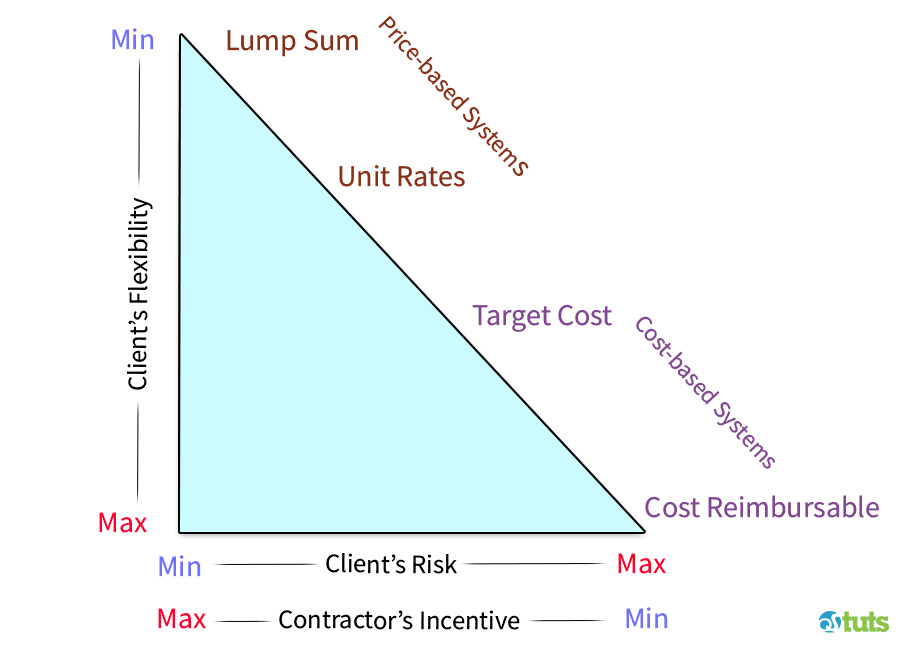In the previous article, we discussed the types of contracts in construction. Now you are going to study how to select an appropriate contract Type for your construction project.
The choice of an Appropriate Contract Type
Choosing the appropriate contract type (lump sum, unit rate, cost-reimbursable, target cost contracts) depends on three key factors: flexibility, incentive and risk-sharing
Flexibility
When it comes to flexibility, you want a contract that can evolve with the project, allowing you to make changes as needed. The Client needs the leeway to adapt to potential changes that may arise, though they may not be able to define them now.
Incentive (Motivation)
Incentives should be in place to reward the parties for meeting their contractual obligations. The contractor needs appropriate motivation to carry out their duties efficiently.
Risk allocation

In the construction industry, risks can come in a variety of forms.
- For example, physical risks, such as poor site conditions, natural disasters and inclement weather, can all pose a threat.
- Additionally, there are risks associated with the construction process itself, such as delays, incomplete projects and damage.
- Lastly, design risks can present issues, such as incomplete plans, lack of information and changes to the design.
Overall, the selection of the most suitable contract type should come down to an assessment of the three above criteria. To ensure the best outcome, each factor should be considered and weighed against each other. With the right contract type chosen, both parties can benefit from a successful and mutually beneficial contractual arrangement.
Characteristics of the Contract Type

What the Appropriate Contract Type Would You Recommend in the Following Situations and Why?
Situation 1: Selecting an Appropriate Contract Type
At the tender stage, The design is finalized and no more changes are expected. The Client desires to keep the need for resources in contract management to the absolute minimum.
Answer:
Contract type should be a Lump sum
Reasons:
- The Client has no need for flexibility as the design is finalized and no alterations are anticipated. Having a contract that offers flexibility may have consequences for the Client, so if the design is complete, opting for a contract that allows for this is unnecessary.
- Additionally, the Client doesn’t want to involve their resources in the contract management. There are other types of contracts that require Client input, but the Lump Sum contract does not.
- Choosing this contract reduces the Client’s risk and motivates the contractor to work efficiently. Ultimately, Lump sum contract is the best option for the Client and the contractor.
Situation 2: Selecting an Appropriate Contract Type
There are high risks involved (considerable change and disruption are expected), but the Client’s procedures and regulations prevent the use of a cost-based contract.
Answer:
Contract type should be a Unit Rate Contract
Reasons:
- Ideally, the high risks involved in the project would lead you to use a cost-based contract. Therefore, cost reimbursable or target cost contract types are not suitable.
- However, because your procedures and regulations prevent the use of a cost-based contract, you need to go to a contract within the price-based system.
- Within the price-based system, a unit rate contract is more appropriate to use than a lump-sum contract. The reason is that Client needs a type of contract that can give you flexibility (due to the considerable changes and disruption) and which, at the same time, is allowed by your procedures and regulations.
Situation 3: Selecting an Appropriate Contract Type
The meaning of the job during the bidding process is inadequate due to the focus on the anticipation of huge variations in the work. The job is complicated and involves serious, unquantifiable risks. The Client desires to provide some motivation to the contractor to complete the task efficiently, and you are willing to participate in managing the job.
Answer:
Contract type should be a Target cost
Reasons:
Because of the high risks involved, a cost-based system (i.e. involving cost-reimbursable and target cost) needs to be adopted. However, because the Client wants to create some incentive for the contractor to perform efficiently, a target cost contract would be more appropriate to adopt than a cost-reimbursable contract.
Situation 4: Selecting an Appropriate Contract Type
At the tender stage, the design is complete, but changes to quantities of work are anticipated. New items of work would not be introduced.
Answer:
Unit Rate Contract
Reasons:
- Because your design is complete, you need to adopt a price-based system (i.e. Lump Sum or Unit Rate).
- However, because the facility needs to accommodate changes in quantity, a lump sum contract would not be appropriate (because a small margin of flexibility is needed to accommodate changes in quantity).
- Therefore a Unit Rate contract is the appropriate type of contract to adopt.







